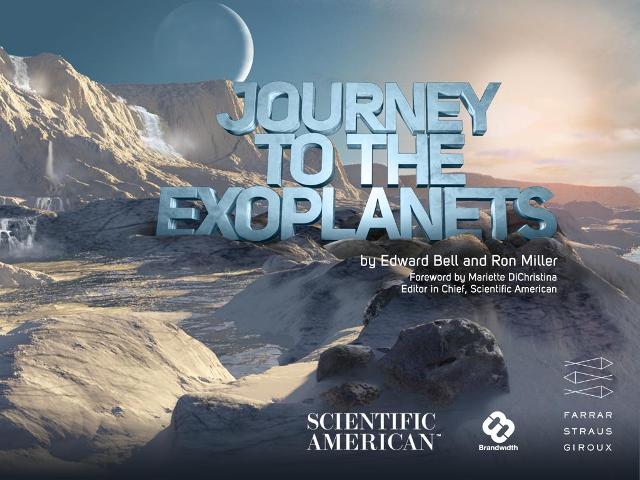Are Apps the New Ebooks?
It’s hard to believe it’s been five years since the first generation of e-reading hardware arrived courtesy of Sony and Amazon. In that time, we’ve seen breakneck, triple-digit growth and even some publishers forgoing print media altogether as the transition from paper to pixel cements itself in the marketplace. Definitively, ebooks are now the most important segment in book publishing today.
Up until this point, ebooks have existed simply as the digital equivalents of paper books, a 21st century reinvention of traditional print analogues. But what if they could be not an equivalent of print but a contemporary augmentation of it?
I saw a glimpse of this ebook evolution in the recently released iOS exclusive Journey to the Exoplanets, a collaborative effort between Scientific American and other boffins of the astronomer variety. Upon playing around with it on my family’s iPad, I found it just as much an interactive app as it is something to be read. Let’s call it space porn for astronomy fans. Multimedia elements are interspersed throughout its pages, supplementing the text with audiovisual bits.
Beyond the 3D illustrations and animations, the app makes innovative use of the iOS hardware, transporting you to panoramic birds-eye views of planets and galaxies by appropriating the iPad’s accelerometer and gyroscope controls. You can carry out basic experiments with explanations of the results. And perhaps its capstone feature is the Planet Builder, which allows you to create a planet from the ground up, assigning basic parameters such as the size, age and number of orbiting moons of your planet. While there is a fair amount of reading to be done in between, it’s clear the text takes a secondary role to the audiovisual and interactive elements. It’s basically a website designed specifically to harness the power of your iPad, and it’s highly effective.
It’s clear the boundaries are now blurred between interactive website, ebook and app. Apple lists Journey to the Exoplanets under its Books category, though it is not carried by any of the ebook vendors. It must be purchased through the iTunes marketplace, and it’s launched via its own icon on the homescreen, similar to other apps. JttE even has a version number association, and updates are pushed directly to it.
We’ve seen this before with Jay-Z’s Decoded, where paperback, ebook, enhanced ebook and exclusive iOS app editions were released. In the enhanced ebook and dedicated app versions, the book’s text, music videos and interviews can all be consumed via a single interface.
The ill-defined classification is really unimportant. Regardless of what rubrics you use to delineate this type of digital creation, I’d like to see more of them. “Enhanced” ebooks such as Journey to the Exoplanets represent not just a leap forward for ebooks but redefine books in general. They can add to the engagement and augment your understanding of the information in ways that straight text works cannot. An ebook with app-like capabilities can guide you through a narrative or process or allow you to ask questions and set up what-if scenarios within the interface itself. Diagrams and images can be zoomed and dissected. If a picture is worth a thousand words, then multimedia is worth a million.
This non-linear, media-centric style of reading is perhaps better suited to nonfiction works like science and history textbooks, although fiction works could use non-linear progression in interesting ways. I’m sure I’m not the only one who remembers reading the Choose Your Own Adventure novels as a kid, where the reader is given choices at each plot crossroads to determine how the story plays out. Think Mass Effect in novel form, where depending on the combination of choices you make, there exists the possibility of some 20 different endings. Navigation through such a book would obviously be easier with an iPad or other electronic device rather than a printed book. I’m sure minds far more creative than mine can conjure up even more innovative concepts.
Admittedly, there are a few technology-specific asterisks preventing more works like Journey to the Exoplanets from appearing on the market. One of the major costs unique to digital publishing involves making sure each page and element render correctly on each of the e-reader platforms, including mobile and desktop. For this reason, it’s likely more economically sensible for a publisher to develop a release for a single platform, which is the case with the iOS-exclusive JttE. Unfortunately, platform-specific apps leave other platform owners out in the dark and tie its users to a single device or platform. There’s no reason to expect JttE will be released on Android, for example.
Future compatibility would always remain a concern. Something so ripe with multimedia elements demands a certain level of hardware requirements, meaning older devices may not support newer, richer titles. Finally, while standard ebooks are encoded in popular formats which will be around for the foreseeable future, app-style ebooks instead rely on stand-alone software.
I don’t know whether these issues are resolvable, or if “enhanced” ebooks are dead on arrival, but I see great potential here, particularly for learning and nonfiction style works. If authors and artists can gain the support of publishers, we may anticipate greater innovation in the years to come as the lines between apps and ebooks are redrawn.
Your thoughts? Do you want to see more interactive ebooks? Do you think they would be more effective than straight text books in education systems? What are some “enhanced” ebooks or book-like apps that you’ve discovered? Share in the comments.
External Link: Journey to the Exoplanets



Comments